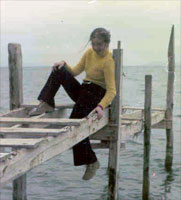|
Tuesday morning in the winter of '96, I left the manuscript of my
first novel with two Greek publishers – the most renowned and the
closest friend.
A fortnight later, the most renowned left a message on my answering
machine: we’re interested in signing a contract with you
immediately!
That day, I made a remarkable impression as a lame Apache dancer on
my young son as he played the Red Indian chief under the table. I’d
just walked in, barely had time to prize the one shoe off with the
one hand and press the button on the answering machine with the
other, when I started leaping round Big Chief’s tent, whooping and
hollering a a a a a a a a a a a a a a a a a a a a a a a a a a a a a
a a a a a a a a a a a a a a a a a a a a a a a a a a a a a a a a with
one shoe in my hand and the other on my foot as the celebrated voice
repeated her wish over and over: we’re interested in signing a
contract with you immediately we’re interested in signing a contract
with you immediately. I pressed play every time I danced past
the machine.
Two days before I signed the contract, I phoned the friend who’d
left me in silence for so long: he wasn’t interested, the manuscript
needed a lot of work, I should call round for a coffee whenever I
felt like it.
Ten days later I dropped a note off round his office wishing him a
merry Christmas and the renowned publisher’s list of forthcoming
publications before going out for him to buy me a drink.
The following Christmas, we left Athens for a Roman family holiday,
having cashed the cheque that accompanied the Best New Author Award
for 1997.
In the months
that followed, I let my surprise and wonder drive me nuts. What was
all that NONSENSE going on with THE BOOK?
Another year
later, I let the slippery slope get me like Alice Down the Rabbit
Hole as I asked myself: To write again or not to write again? And
why write again? And why not write again? And write again for who?
And for who not to write again? And what if I don’t write again? And
what if I do?
As I plummeted, my friends grew tired of answering and left me to my
fate. Indeed, when one day I handed one of them some pages I called
a novel, he angrily retorted, veery very good. Keep this up and
we’ll be publishing the COLLECTED WORKS in no time at all. And
another one, whom I’d just asked without handing him a thing,
replied one drunken evening that I was sooooo right in
eeeverything, and that I could head for the precipice all by myself.
I found the answer I was looking for on the down and down one
morning under TH in my renowned publisher’s catalogue:
THalassis Giorgos, THeodorakopoulos
Ioannis, THeodoropoulou Viky, THucydides, [TH]Cervantes Miguel,
THeotokas Giorgos, THeotokis Konstantinos.
And got back to some serious work on the spot!
How could I give up company like that?
 |